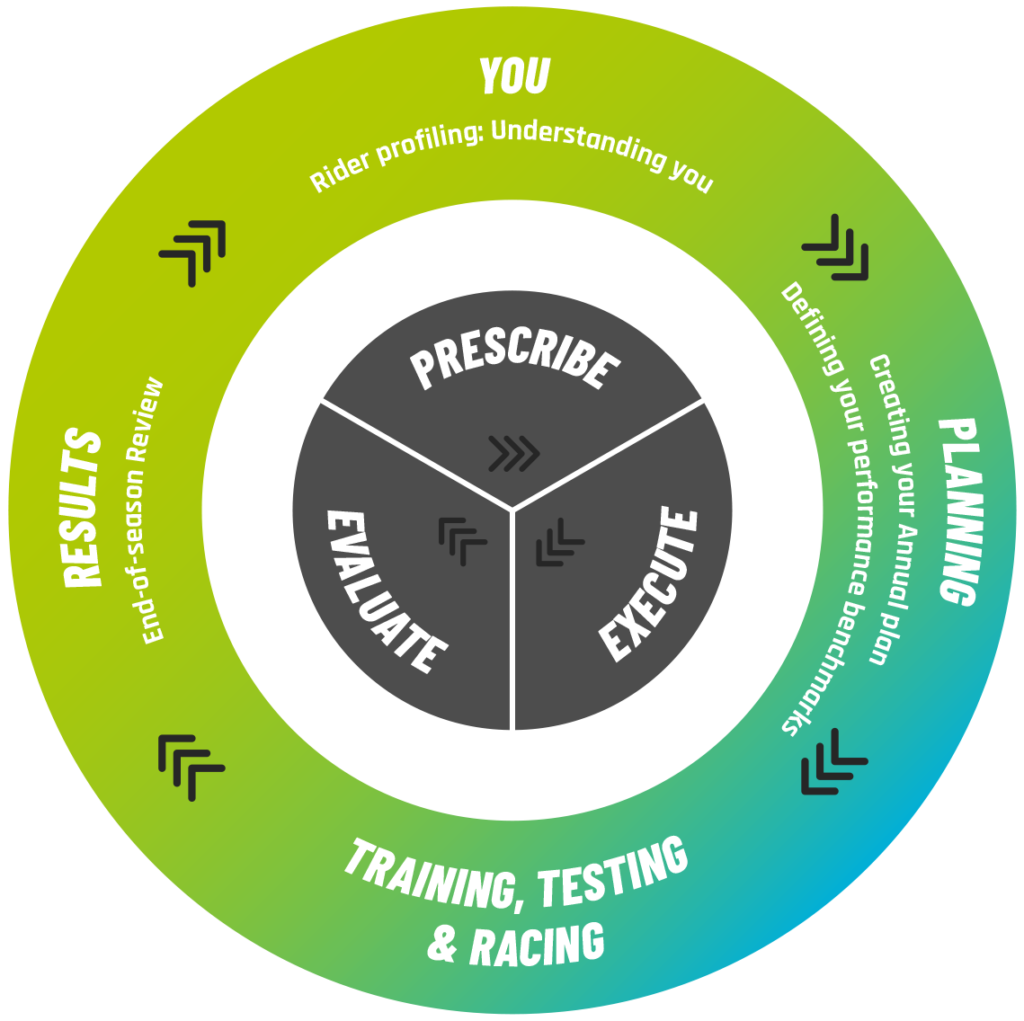How does cycle coaching work?
Cycle coaching involves a coach providing personalised guidance, training plans, and support to help cyclists improve their performance and achieve their cycling goals. Here’s my overview of how high-quality cycle coaching works:
- Goal Setting: The coaching process starts with identifying the cyclist’s specific goals, such as: improving endurance, increasing speed, training for a race or challenge event or targeting specific areas for improvement. A good coach doesn’t focus exclusively on the physiological. To fully develop a rider you should consider the whole person: physiologically, technically, tactically and psychologically.
- Assessment: The coach evaluates the cyclist’s current fitness level, cycling technique, strengths, weaknesses and relevant medical background. This assessment usually takes the form of a combination of questionnaire and one-to-one interview. Good coaches will assess the rider’s entire lifestyle on and off the bike.
- Annual (or Season) Training Plan Development: The coach then evaluates the assessment and prepares an annual plan for discussion with the rider. This top-level plan should highlight their goals and key events for the coming year and ‘periodise’ the year into logical training blocks. Each block will have a specific area of focus building progressively towards the rider’s goals.
- Benchmarking: In order to plan individual training sessions, it is necessary to do a benchmarking exercise. This is to determine a rider’s physical strengths and weaknesses, and to define accurate training zones. This ensures two things: firstly, that rider are working at the right intensity for optimum training adaption and secondly that their progress can be tracked.
- Training Plan Prescription: Once the rider has bought-in to the overall plan, the coach can plan individual workouts. Often they are uploaded to an online platform like TrainingPeaks or Today’s Plan where training data can be overlaid for analysis.
- Communication and Support: The coach maintains regular communication with the cyclist to provide guidance, monitor progress and make adjustments to the training plan as needed. This communication can happen through in-person meetings, phone calls, emails, or online platforms.
- Performance Tracking: Coaches can use various tools and techniques to track the cyclist’s performance, such as: heart rate monitors, power meters, and GPS devices. This data helps assess progress, avoid over-training and make data-driven adjustments to the training plan.
- Technique and Skill Development: Coaches may also focus on improving cycling technique, such as pedal stroke efficiency, bike handling skills, and positioning on the bike. They provide feedback, drills, and exercises to enhance these aspects. Highly skill-based disciplines such as cyclocross may require specific one-to-one coaching sessions to really develop good technique.
- Motivation and Accountability: Coaches play a crucial role in providing motivation and accountability to help cyclists stay committed to their training plans, overcome obstacles and maintain consistent progress.
- Season Review: Performance coaches should always conduct an end-of-season review. This may be a formal document, or a relaxed chat with the rider. The end-of-season break is the ideal time to look back at the preceding season and discuss what went well and want didn’t. It is crucial to review progress against those goals set right at the beginning of the year.

Coaching is a long-term endeavour and relies on a good working relationship between rider and coach. A well-matched rider-coach team can work together effectively to deliver consistent, long-term gains. As a rider who has been coached for many years, I can guarantee that coaching can deliver long-term benefits that far outweigh the short-term gains made from shiny new kit.
If you would like some FREE advice on your training or have questions about your bike fit, email me at russell@insynccyclingcoach.com or call 07490 958136. Or you can book a FREE call-back.
